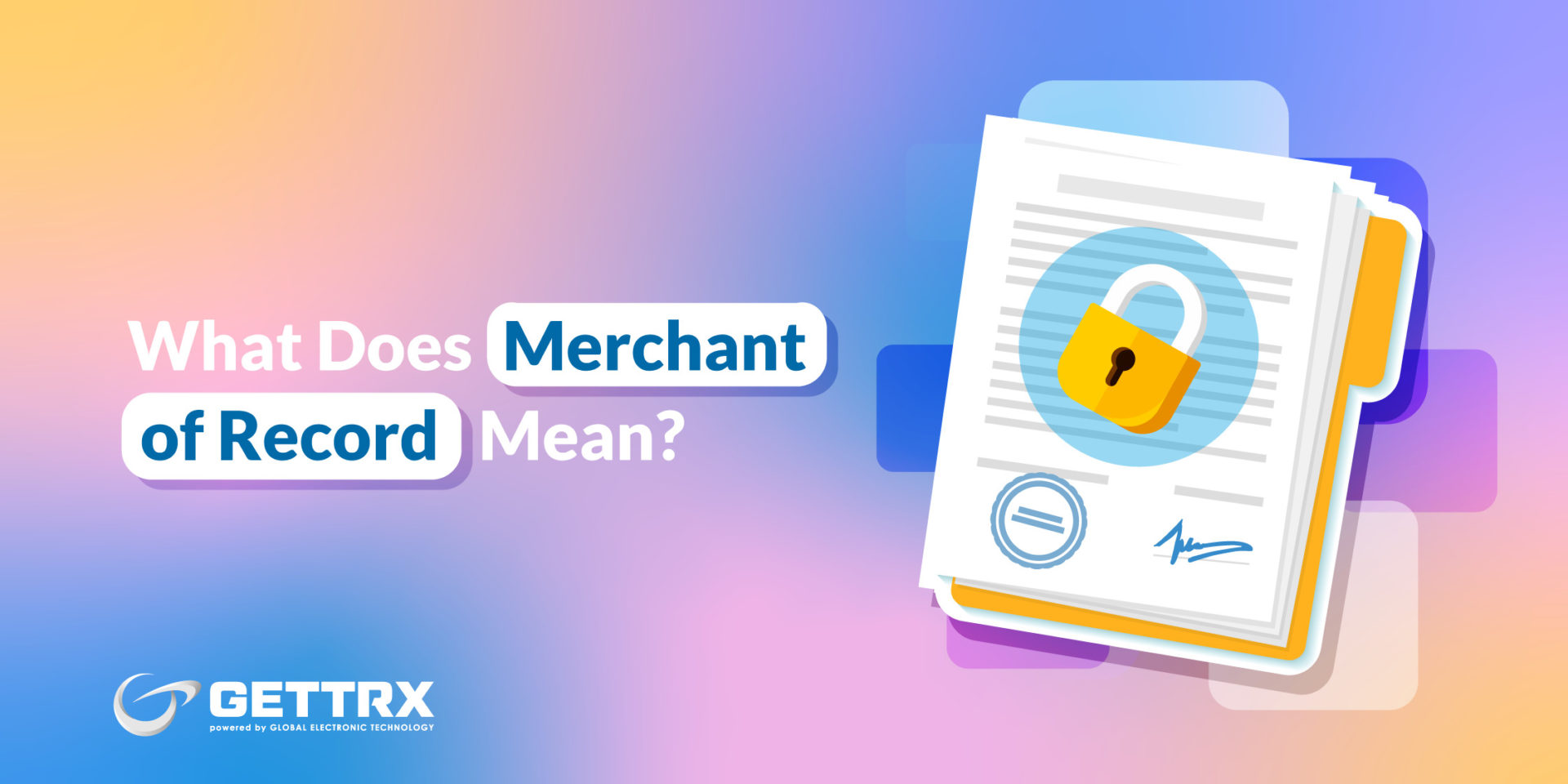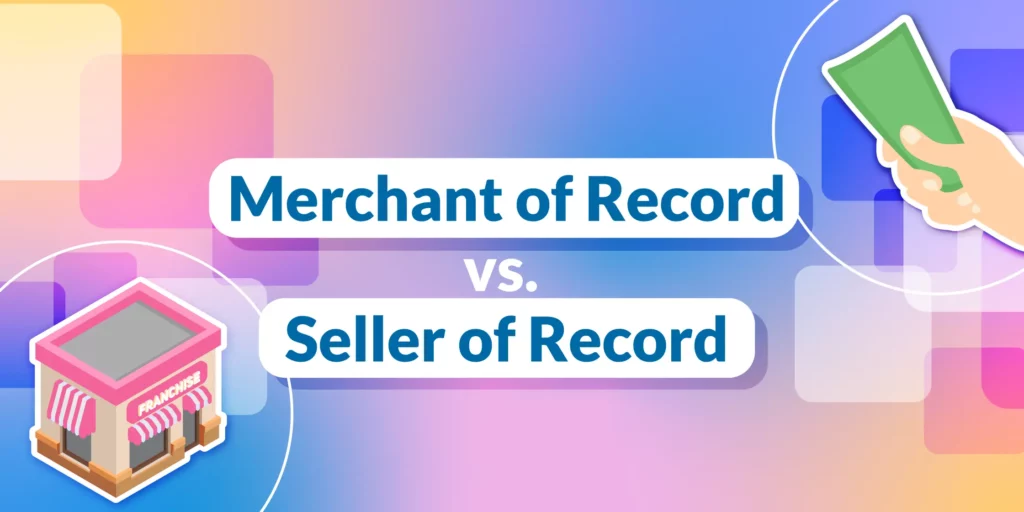Recent data suggests that cross-border e-commerce is projected to grow at an unprecedented rate, with businesses tapping into markets they never thought possible.
However, with this expansion comes the challenge of diverse tax regulations, ensuring payment compliance, and managing the intricacies of currency conversions.
The Merchant of Record model addresses these challenges head-on, allowing businesses to focus on what they do best: crafting exceptional products and building lasting customer relationships.
But what exactly does a Merchant of Record entail? And why are businesses, from SaaS providers to e-commerce giants, increasingly leaning towards this model?
This comprehensive guide delves into the world of MoR, exploring its nuances, benefits, and pivotal role in the modern e-commerce ecosystem.
Before we dive in:
Table of Contents
- Is GETTRX a Merchant of Record?
- Key Takeaways
- What is a Merchant of Record?
- How Does a Merchant of Record Work?
- What are the Benefits of Using an External MoR?
- Limitations of a Merchant of Record
- What’s the Difference Between a Merchant of Record and a Payment Service Provider?
- Merchant of Record (MoR) vs. Seller of Record (SoR)
- Limitations of a Merchant of Record
- Conclusion
- Frequently Asked Questions (FAQs)
Is GETTRX a Merchant of Record?
Absolutely! GETTRX stands tall as a Merchant of Record, offering businesses a comprehensive suite of services tailored to the dynamic world of e-commerce.
With its global reach, expertise in local regulations, and commitment to ensuring seamless transactions,
GETTRX is a trusted partner for businesses looking to simplify their operations and focus on growth.
Whether you’re a budding e-commerce platform or an established global brand, GETTRX offers solutions that are not just about transactions but about building lasting relationships.
Dive into the world of hassle-free transactions, global reach, and unparalleled customer experience with GETTRX as your Merchant of Record.
Explore GETTRX’s offerings and get started today!
Key Takeaways
- Merchant of Record (MoR) processes online transactions, ensures regulatory compliance, and manages associated liabilities.
- MoRs handle transaction initiation, verification, regulatory adherence, currency conversion, tax management, and post-transaction services.
- E-commerce platforms, SaaS providers, digital content creators, online gaming platforms, marketplace platforms, event ticketing, and educational platforms benefit from MoRs.
- Streamlined global transactions, regulatory compliance, fraud prevention, efficient dispute resolution, advanced analytics, cost savings, and enhanced customer experience.
- While both MoR and PSP facilitate online transactions, MoRs offer comprehensive solutions, managing every aspect of a transaction, whereas PSPs focus on payment processing.
- Merchants of Record and Sales of Record play roles in transactions, assume liabilities, ensure regulatory compliance, handle financial aspects, and impact customer experience.
- MoRs focus on payment processing and regulatory compliance, while SoRs emphasize the physical flow of goods.
- Limitations of MoR include loss of direct control, brand dilution, dependency risks, cost implications, integration challenges, limited customization, and potential for miscommunication.
- While choosing the Right MoR for your business, consider your business’s needs, global reach, regulatory compliance, security, integration capabilities, transparent pricing, customer support, flexibility, and MoR reputation.
What is a Merchant of Record?
A Merchant of Record (MoR) is a legal entity responsible for selling goods or services to the end customer.
They are a recognized entity—often a company—authorized to process and accept payments on behalf of another business.
This means that when a customer makes a purchase, the MoR’s name appears on their bank or credit card statement, not the name of the actual seller of the product or service.
But the role of an MoR goes far beyond just handling money. It’s a multifaceted position that encompasses a range of responsibilities:
Regulatory Compliance
One of the primary roles of an MoR is to ensure that all transactions are compliant with the myriad of local, state, national, and even international regulations. This includes everything from sales tax collection and remittance to adhering to specific payment regulations in different countries.
Payment Processing
At a fundamental level, the MoR handles the actual mechanics of the transaction. This involves everything from verifying the authenticity of credit card details to ensuring a secure funds transfer.
Currency Management
For international businesses, dealing with multiple currencies can be a logistical nightmare. An MoR simplifies this process by handling currency conversions, ensuring that customers are charged the correct amount in their local currency and businesses receive the right amount in theirs.
Dispute Resolution
If a customer isn’t happy with a purchase and initiates a chargeback, it’s the MoR’s responsibility to handle this process. They’ll investigate the claim, liaise with the bank or credit card company, and determine whether the chargeback is legitimate.
Risk Management
Fraud is a significant concern in the online world. MoRs employ sophisticated algorithms and verification processes to detect and prevent fraudulent transactions, protecting both the business and the end consumer.
The rise of the MoR model can be attributed to the complexities of the modern e-commerce environment.
As businesses expand their reach, venturing into new markets and territories, the challenges of dealing with different payment systems, regulations, and currencies multiply.
The MoR is an intermediary, smoothing out these complexities and allowing businesses to focus on what they do best: selling their products or services.
A Merchant of Record protects businesses, taking on complex and time-consuming tasks associated with processing payments and ensuring compliance.
In doing so, they play a crucial role in fostering trust between businesses and their customers, ensuring that every transaction is smooth, secure, and compliant with all relevant regulations.
Check out this video on Merchant of Record.
How Does a Merchant of Record Work?
Let’s delve into the mechanics of a Merchant of Record.
Initiating the Transaction
When a customer decides to make a purchase, they provide their payment details, credit card information, bank account details, or other payment methods.
The MoR’s system captures this information, ensuring it’s encrypted and secure.
Transaction Verification
Before any money changes hands, the MoR verifies the transaction. This involves checking the authenticity of the payment details, ensuring sufficient funds, and running anti-fraud checks. Sophisticated algorithms assess the transaction’s risk level, flagging any suspicious activity.
Regulatory Adherence
Each region or country has its own set of regulations surrounding e-commerce transactions. The MoR ensures that the transaction adheres to these.
For instance, if a customer from Europe makes a purchase, the MoR ensures compliance with GDPR and other relevant EU regulations.
Currency Conversion
If the transaction involves international customers, currency conversion comes into play. The MoR calculates the exact amount based on current exchange rates, ensuring that the customer is charged accurately and the business receives the correct amount.
Sales Tax Management
Certain sales taxes or VAT might apply depending on the customer’s location. The MoR calculates, collects, and remits these taxes on behalf of the business, ensuring full compliance with local tax laws.
Completing the Transaction
Once all checks are complete and the transaction is verified, the MoR facilitates the transfer of funds from the customer’s account to the business’s account.
This is done minus any fees or commissions that the MoR might charge for its services.
Post-Transaction Services
The MoR’s role continues once the transaction is complete. They handle any post-transaction issues, such as refunds, chargebacks, or disputes.
If a customer isn’t satisfied and requests a refund, the MoR manages this process, ensuring that funds are returned promptly.
Reporting and Analytics
Many MoRs provide businesses with detailed analytics and reports on their transactions. This data is invaluable, offering insights into sales trends, customer behavior, and potential areas of improvement.
Continuous Updates
The world of e-commerce is dynamic, with regulations, payment methods, and customer preferences constantly evolving.
MoRs continuously update their systems and processes to stay ahead of these changes, ensuring that businesses always have access to the latest tools and features.
Types of Businesses That Use MoR Services
The Merchant of Record (MoR) model has found resonance with a diverse range of businesses.
From the bustling digital storefronts of e-commerce giants to the niche platforms of software developers, the MoR framework offers solutions tailored to unique challenges and requirements.
Let’s explore the types of businesses that often turn to MoR services.
E-commerce Platforms
The most evident adopters of MoR services are e-commerce businesses. With a global customer base, these platforms grapple with the intricacies of international payment processing, currency conversions, and region-specific tax regulations.
An MoR simplifies these complexities, allowing e-commerce platforms to focus on product offerings, customer service, and market expansion.
Software as a Service (SaaS) Providers
With their subscription-based models, SaaS companies require a seamless and recurring billing system.
MoRs facilitate this by ensuring that subscriptions are renewed, payments are processed on time, and any changes in subscription tiers are accurately reflected in billing.
Digital Content Creators
From musicians releasing their latest tracks to authors publishing e-books, digital content creators need a reliable system to sell their creations worldwide.
MoRs ensure these artists receive their due while handling global sales, digital rights management, and region-specific pricing.
Online Gaming Platforms
With its in-game purchases, subscriptions, and global player base, the gaming industry presents unique challenges.
MoRs help gaming platforms manage these transactions, ensuring that players can make purchases smoothly, regardless of geographical location.
Marketplace Platforms
Websites that host multiple sellers, like artisan marketplaces or freelance service platforms, benefit immensely from MoR services.
The MoR can handle transactions for each seller, ensuring that funds are correctly distributed and all sales comply with local regulations.
Event and Ticketing Platforms
For platforms that sell tickets to events, concerts, or workshops, the spike in transactions around popular events can take time to manage.
MoRs ensure that these high-volume sales periods run smoothly, handling everything from seat-specific pricing to refunds for cancellations.
Educational Platforms
Online courses, webinars, and digital learning materials have grown in popularity. Educational platforms use MoRs to manage enrollments, course fees, and access to paid content, ensuring learners have a hassle-free experience.
In essence, any business that operates in the digital realm and deals with a diverse and global customer base can benefit from the services of a Merchant of Record.
What are the Benefits of Using an External MoR?
While many consider handling transactions in-house, the allure of external Merchant of Record (MoR) services is hard to ignore.
Here are the benefits they offer.
Streamlined Global Expansion
One of the most significant challenges businesses face when expanding globally is understanding and adhering to the diverse regulations of different regions.
An external MoR, with its expertise in global markets, ensures that businesses can venture into new territories without the fear of non-compliance.
They handle everything from currency conversions to region-specific tax regulations, allowing businesses to focus on market strategies and customer engagement.
Reduced Operational Burdens
Managing transactions, especially globally, can be a logistical nightmare. By outsourcing this to an MoR, businesses can offload a significant portion of their operational burdens.
This reduces overhead costs and allows businesses to allocate resources to core functions like product development and marketing.
Enhanced Payment Security
External MoRs invest heavily in state-of-the-art security infrastructure, employing advanced encryption techniques and fraud detection algorithms. This ensures that every transaction is secure, instilling customer trust and reducing the risk of costly data breaches.
Efficient Dispute Resolution
Chargebacks and payment disputes can be time-consuming and detrimental to a brand’s reputation. MoRs handle them efficiently, liaising with banks and credit card companies, investigating claims, and ensuring genuine disputes are resolved promptly.
This protects the business’s bottom line and ensures customer satisfaction.
Access to Advanced Analytics
Understanding transaction trends, customer behavior, and sales metrics is crucial in today’s data-driven world.
Many MoRs provide businesses with detailed analytics, offering insights that can shape marketing strategies, product offerings, and pricing models.
Scalability
As businesses grow, so do their transaction volumes and complexities.
External MoRs are equipped to handle this growth, ensuring that every transaction is processed seamlessly whether a business has a hundred transactions a day or a million.
Regulatory Updates
The world of e-commerce regulations is ever-evolving. MoRs stay abreast of these changes, ensuring that businesses are always compliant, irrespective of how regulations might shift.
Enhanced Customer Experience
At the heart of every business is its customers. MoRs ensure customers have a smooth and hassle-free transaction experience, from secure payment processing to easy refunds.
A positive transaction experience can enhance brand loyalty and encourage repeat purchases.
Using an external Merchant of Record is about more than just outsourcing payment processing. It’s about partnering with an entity that brings expertise, security, and efficiency to the table.
It’s also about ensuring that as the business landscape evolves, the transactional backbone remains robust and agile, ready to meet the challenges of tomorrow.
Limitations of a Merchant of Record
While Merchants of Record (MoRs) offer businesses numerous advantages, they have limitations.
Understanding these constraints is essential for businesses to make informed decisions and optimize operations.
Loss of Direct Control
By outsourcing payment processing and regulatory compliance to an MoR, businesses might feel they’ve relinquished some control over their transactions.
This can be a concern for companies that want to have a hands-on approach to every aspect of their operations.
Potential Brand Dilution
Since the MoR’s name appears on bank and credit card statements, customers may not immediately associate the transaction with the actual seller.
This can lead to potential brand dilution and impact customer recognition and loyalty.
Dependence on a Third Party
Relying heavily on an MoR means businesses depend on the MoR’s infrastructure, security measures, and operational efficiency.
Any downtime or issues the MoR faces can directly impact the business’s sales and reputation.
Cost Implications
While MoRs streamline many processes, they come at a cost. Businesses need to weigh the fees and commissions the MoR charges against the benefits they offer. For some smaller businesses, these costs might significantly affect their profit margins.
Customization Constraints
MoRs offer standardized solutions that cater to a broad spectrum of businesses. Companies with unique requirements or those looking for highly customized solutions might find the offerings of an MoR a bit restrictive.
Potential for Miscommunication
With an intermediary involved, there’s always a chance for miscommunication or misalignment in terms of business goals, customer service standards, or operational priorities.
Regulatory Backlash
While MoRs ensure compliance with local and international regulations, any oversight or error on their part can have repercussions for the business. Companies must ensure their MoR is diligent and up-to-date with all regulatory changes.
Integration Challenges
Integrating an MoR’s systems with existing business platforms, CRM systems, or analytics tools might pose challenges.
Ensuring seamless integration requires additional resources and technical expertise.
Customer Service Handoffs
If customers have issues related to payments or transactions, they might be directed to the MoR’s customer service team. This handoff can lead to potential inconsistencies in service quality or response times.
Data Ownership Concerns
Businesses might have concerns about the ownership and access to transactional data.
While MoRs handle the data securely, companies need to ensure they have access to all relevant data for their analytics and decision-making processes.
What’s the Difference Between a Merchant of Record and a Payment Service Provider?
A Payment Service Provider (PSP) is a platform that offers an alternative to traditional payment methods like cash, debit, or credit cards. They handle the processing of payments, ensuring that the money moves securely from the buyer to the seller.
However, their role is limited to this transactional aspect. They don’t delve into other facets of the order process, such as handling sales and VAT taxes or managing payment disputes.
While some PSPs, like Stripe, can accept multiple currencies and are equipped to facilitate payments in different countries, they don’t assist businesses in calculating or adhering to a country’s specific tax requirements.
On the other hand, a Merchant of Record (MoR) plays a more comprehensive role.
The external MoR sells goods or services on behalf of the business and assumes the liability related to the transaction.
This means the MoR takes on many responsibilities, from ensuring global tax and regulatory compliance to managing payment disputes and handling currency conversions.
For instance, if a business uses an MoR and sells a product to a customer in Canada, the MoR would handle the sales tax, VAT, and other compliance responsibilities for that sale. The customer’s receipt would come from the MoR, and the MoR’s name would appear on their bank or credit card statement.
The distinction becomes even clearer when we consider the challenges of global business operations.
For a company selling digital products or software internationally, understanding and complying with the tax regulations of each country can be daunting.
A PSP might facilitate the payment but won’t help with these tax intricacies.
An MoR, however, streamlines this process. They have the infrastructure and expertise to ensure businesses comply with international regulations, from calculating and remitting taxes to understanding region-specific payment preferences.
A PSP focuses on the transaction itself, ensuring secure payment processing. In contrast, an MoR offers a holistic solution, managing every aspect of the transaction, from payment processing to regulatory compliance, ensuring businesses can operate seamlessly globally.
Merchant of Record (MoR) vs. Seller of Record (SoR)
Consider this analogy to draw a more apparent distinction: Imagine a global online marketplace where various vendors sell their products.
Each vendor, responsible for the quality and delivery of their product, acts as the Seller of Record.
However, when a customer makes a purchase, the payment is processed by the platform itself, which, in this case, acts as the Merchant of Record, ensuring that the transaction is smooth, secure, and compliant with all relevant regulations.
Differences Between Merchant of Record (MoR) and Seller of Record (SoR)
| Aspect | Merchant of Record (MoR) | Seller of Record (SoR) |
| Primary Role | Primarily responsible for payment processing and ensuring transactions are compliant with local and international regulations | Focuses on the physical flow of goods, including inventory management, shipping, and handling returns. |
| Liability Scope | Assumes liability for the financial aspects of a transaction, including payment disputes and chargebacks. | Assumes liability for the physical goods, including their condition, delivery, and any potential damages. |
| Regulatory Focus | Primarily concerned with financial regulations, sales tax, VAT, and e-commerce laws. | Primarily concerned with trade regulations, customs, import/export laws, and product-specific regulations |
| Customer Interaction | Directly interfaces with customers during the payment process and for any payment-related issues. | Interacts with customers regarding product delivery, shipping updates, and physical product issues. |
| Financial Management | Manages the entire financial transaction, from payment processing to refunds. | Might not handle financial transactions but focuses on product delivery and returns logistics. |
| Operational Focus | Operates mainly in the digital realm, ensuring smooth online transactions. | Operates in the physical realm, managing warehousing, shipping, and logistics. |
| Tax Responsibilities | Handles sales tax, VAT, and other transaction-related taxes. | Might handle taxes related to the import/export of goods, duties, and other trade-related levies. |
| Relationship with PSPs | Directly interfaces with Payment Service Providers to facilitate online transactions. | Might not directly deal with PSPs unless involved in the financial aspect of the transaction. |
| Risk Management | Primarily manages risks related to online fraud, payment disputes, and chargebacks. | Manages risks related to product damages, shipping delays, and inventory management. |
| Global Operations | Focuses on ensuring compliance with e-commerce regulations across different countries. | Focuses on navigating the complexities of international shipping, customs, and product regulations. |
This table clearly distinguishes between the roles and responsibilities of MoRs and SoRs. While there are overlaps in their functions, their primary areas of expertise and operation differ significantly, each catering to specific needs within the commerce ecosystem.
MoR ensures that transactions are seamless and compliant, while SoR ensures product quality and customer satisfaction.
Together, they form the backbone of a successful e-commerce operation, each playing a crucial role in ensuring businesses thrive in an increasingly competitive digital marketplace.
Limitations of a Merchant of Record
The limitations of a Merchant of Record include the following:
Loss of Direct Control
By outsourcing payment processing and regulatory compliance to an MoR, businesses might feel they’ve relinquished some control over their transactions.
This can be a concern for companies that want to have a hands-on approach to every aspect of their operations.
Brand Dilution
Since the MoR’s name appears on bank and credit card statements, there’s a chance that customers might not immediately associate the transaction with the actual seller. This can lead to potential brand dilution and might impact customer recognition and loyalty.
Dependence on a Third Party
Relying heavily on an MoR means businesses depend on the MoR’s infrastructure, security measures, and operational efficiency. Any downtime or issues the MoR faces can directly impact the business’s sales and reputation.
Cost Implications
While MoRs streamline many processes, they come at a cost. Businesses need to weigh the fees and commissions the MoR charges against the benefits they offer. For some smaller businesses, these costs might significantly affect their profit margins.
Customization Constraints
MoRs offer standardized solutions that cater to a broad spectrum of businesses. Companies with unique requirements or those looking for highly customized solutions might find the offerings of an MoR a bit restrictive.
Potential for Miscommunication
With an intermediary involved, there’s always a chance for miscommunication or misalignment regarding business goals, customer service standards, or operational priorities.
Regulatory Backlash
While MoRs ensure compliance with local and international regulations, any oversight or error on their part can have repercussions for the business. Companies must ensure that their MoR is diligent and up-to-date with all regulatory changes.
Integration Challenges
Integrating an MoR’s systems with existing business platforms, CRM systems, or analytics tools might pose challenges. Ensuring seamless integration can sometimes require additional resources and technical expertise.
Customer Service Handoffs
If customers have issues related to payments or transactions, they might be directed to the MoR’s customer service team. This handoff can lead to potential inconsistencies in service quality or response times.
Data Ownership Concerns
Businesses might have concerns about the ownership and access to transactional data. While MoRs handle the data securely, companies need to ensure they have access to all relevant data for their analytics and decision-making processes.
By understanding these challenges, companies can implement strategies to mitigate risks and ensure a harmonious partnership with their chosen MoR.
How to Choose the Right Merchant of Record for Your Business?
A Merchant of Record (MoR) plays a pivotal role in ensuring smooth transactions, regulatory compliance, and a seamless customer experience.
But with many options available, how does a business zero in on the MoR that aligns perfectly with its needs?
Here’s what businesses need to do to make an informed choice.
Understand Your Business Needs
Before diving into the selection process, it’s crucial to clearly understand your business’s specific requirements.
Are you looking to expand globally? Do you need support with specific payment methods? Answering such questions will help you identify your desired features in an MoR.
Global Reach and Local Expertise
Choosing an MoR with a broad international reach is essential if your business caters to a global audience. More importantly, they should have expertise in local regulations, payment preferences, and currency management for the regions you operate in.
Regulatory Compliance
Ensure that the MoR has a robust framework to stay updated with ever-evolving global regulations. They should proactively ensure compliance, from sales tax collection to data protection laws.
Security and Fraud Prevention
The MoR should employ state-of-the-art security measures to protect transaction data. Look for features like end-to-end encryption, two-factor authentication, and advanced fraud detection mechanisms.
Integration Capabilities
The MoR’s platform should seamlessly integrate with your existing systems- your e-commerce platform, CRM, or accounting software. Check for compatibility and the availability of APIs for custom integrations.
Transparent Pricing
Understand the fee structure of the MoR. Are there setup fees, transaction charges, or monthly fees?
A transparent pricing model without hidden charges is essential to ensure no unpleasant surprises down the line.
Customer Support
Efficient customer support can be a game-changer. Whether it’s resolving disputes, handling chargebacks, or addressing technical glitches, the MoR should offer prompt and practical support.
Reporting and Analytics
Access to detailed transaction analytics can offer valuable insights into customer behavior, sales trends, and potential growth areas. Ensure the MoR provides comprehensive reporting tools.
Flexibility and Scalability
As your business grows, your needs will evolve. The MoR should be flexible enough to accommodate these changes, whether it’s expanding to new regions, supporting additional payment methods, or scaling up transaction volumes.
Reputation and Reviews
Lastly, do your due diligence. Look for reviews, testimonials, and case studies. A reputable MoR with a track record of satisfied clients can be a reliable indicator of their expertise and service quality.
By considering the factors mentioned above and aligning them with your business objectives, you can forge a partnership that simplifies transactions and propels your business to new heights.
Conclusion
As businesses expand their horizons and embrace the global marketplace, having a trusted MoR by their side can be the difference between merely surviving and truly thriving.
Embrace the future of e-commerce with confidence, knowing you’re backed by expertise and dedication.
Frequently Asked Questions (FAQs)
Does the merchant of record keep the money?
The Merchant of Record (MoR) doesn’t keep the money. They process the transaction, ensure compliance, and then transfer the funds to the business after deducting any fees or charges associated with the transaction.
Who is the merchant of record on Amazon?
Amazon acts as the Merchant of Record for transactions on its platform. This means Amazon is responsible for handling payments, managing tax collection, and ensuring compliance for sales made through its site.
Is Stripe a merchant of record?
No, Stripe is primarily a payment gateway and processor. While it facilitates online transactions, businesses or their chosen MoRs are responsible for the broader aspects of the sale, including compliance and tax collection.
Why do airlines want to be a merchant of record?
Airlines prefer to be the Merchant of Record to have direct control over the customer experience, manage revenue recognition, and ensure compliance with industry-specific regulations. Being the MoR also allows airlines to handle disputes, refunds, and chargebacks directly, ensuring quicker resolution and better customer service.










